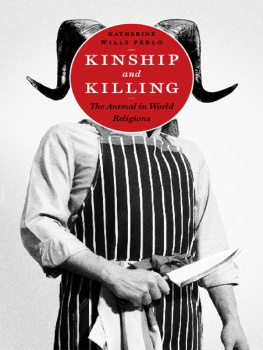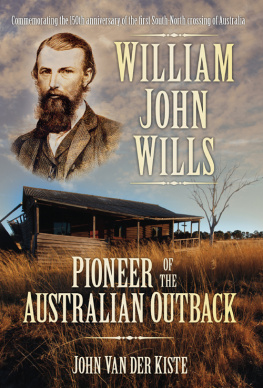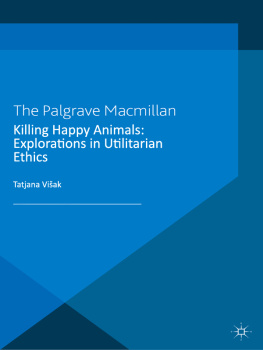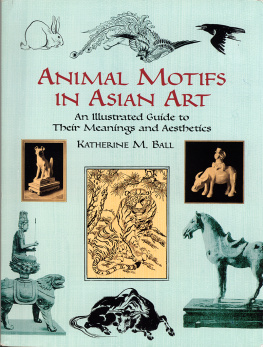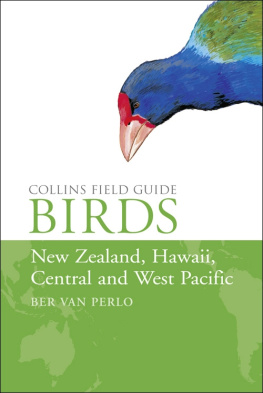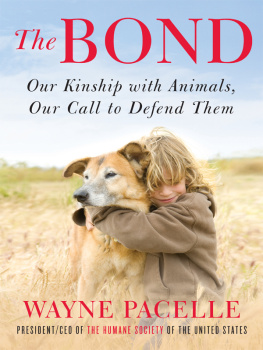Kinship and Killing
KINSHIP AND KILLING
The Animal in World Religions
KATHERINE WILLS PERLO
COLUMBIA UNIVERSITY PRESS
 New York
New YorkCOLUMBIA UNIVERSITY PRESS
Publishers Since 1893
NEW YORK CHICHESTER, WEST SUSSEX
cup.columbia.edu
Copyright 2009 Columbia University Press
All rights reserved
E-ISBN 978-0-231-51960-1
Library of Congress Cataloging-in-Publication Data
Perlo, Katherine Wills.
Kinship and killing: the animal in world religions / Katherine Wills Perlo.
p. cm.
Includes bibliographical references (p.) and index.
ISBN 978-0-231-14622-7 (cloth: alk. paper)ISBN 978-0-231-14623-4 (pbk.: alk. paper)ISBN 978-0-231-51960-1 (e-book)
1. AnimalsReligious aspects. 2. Human-animal relationships
Religious aspects. I. Title.
BL439.P47 2009
205.693dc22
2008036403
A Columbia University Press E-book.
CUP would be pleased to hear about your reading experience with this e-book at .
References to Internet Web Sites (URLs) were accurate at the time of writing. Neither the author nor Columbia University Press is responsible for Web sites that may have expired or changed since the book was prepared.
BOOK & COVER DESIGN BY MARTIN N. HINZE
To my children, Sam, Sarah, and Angus; grandchildren, Rachel and Vinny; and dog, Blackie; and to the memory of my mother Katherine Wills Perlo, and of Heidi, Shane, and Rocky.
CONTENTS
Thanks to editor Wendy Lochner, reviewer Dr Julian Franklin, and an anonymous reviewer for supporting the publication of the book.
Rafeeque Ahmed gave permission to quote from his letters to Robert Tappan. Much material under the headings of Purveyors of Mystical Experience and Teachers of Morality in previously appeared in my article Great Shamans and Great Teachers: Animals as Guides to Truth in Religious Texts, Ecotheology 7.2 (2003): 146162, published by Equinox Publishing, copyright Equinox Publishing Ltd 2003.
Thanks to the anonymous person who put extracts from Masris out-of-print Animals in Islam on the web.
The staff of the internet hall, Elhovo Business Center, Elhovo, Bulgaria, gave valuable technical help and computer and internet facilities while I was temporarily without adequate resources of my own.
I am grateful to my fellow animal-rights campaigners for inspiration and for helping the animals. In particular, thanks to Annette and John Lagan who initiated the founding of what became Dundee Animal Rights (mark 2), Tegwen Brickley and Ruth Woods for helping it to flourish, and Norma George for keeping it going for so long.
The hunters effort to subordinate himself to his natural environment is disturbed by the need to kill. this necessary slaying weighs more and more heavily upon his mind. It seems as though one of early mans major intellectual achievements is the attempt to become free from this burden. He finds a way of thinking death out of existence.
ANDREAS LOMMEL, Prehistoric and Primitive Man
The idea that human beings have a special place in creation is so prominent, in so many religious traditions, that religion itself has sometimes been explained as an expression of mans desire to affirm his own worth.
JAMES RACHELS, Created from Animals
IT IS USUALLY ASSUMED THAT RELIGIOUS DOCTRINES have determined, or at least strongly influenced, their adherents attitudes to animals. My purpose here is to argue that the influence runs, to a considerable degree, the other way round. From a secular perspective, Best observes that animals have been key driving and shaping forces of human thought, psychology, moral and social life, and history overall. My focus being on religion, I offer evidence from the texts of four major worldviewsJudaism, Christianity, Islam, and Buddhism (against the background of its neighboring faiths, Jainism and Hinduism)as well as from their surrounding cultures (including our own) that conflicting feelings about humananimal relations have produced strategies of resolution, which have contributed to religious and philosophical beliefs. Once the beliefs are in place, of course, they in turn reinforce the strategies that have been developed to deal with the conflicts.
Conflicting feelings produce conflicting and diverse ideas. So I give a mixed picture of the religions, as containing both pro- and anti-animal teachings as well as some morally ambiguous ones. This account is offered in place of the frequently found claim that a given authors faith is overwhelmingly or essentially pro-animal. Fully accommodating diversity, the explanation of moral conflict can bring clarity to an apparently chaotic field of beliefs and assuage the unease felt by religious animal advocates on encountering texts that condone animal exploitation.
Another feature of my account is that, in reversing the usually assumed causalityGods/the Buddhas word leads to human attitudesI endorse projectionism, according to which, in the present context, human attitudes toward animals are seen as the immediate source of the doctrines. The devotee could say, quite consistently, that those very attitudes come from God who bestows free will and moral reasoning power, or from the workings of karma, or, in the case of wholly benign inclinations, from the Buddha-nature in everyone. But, by concentrating on the human source, I deal with what we can experience for ourselves, as opposed to metaphysical explanations.
I also reject arguments purely from authority, to the effect that we should, for example, be vegetarian, or not, because scripture says so. In the case of the animal advocate, such an insistence suggests that vegetarianism cannot stand on its merits. There is, by contrast, a tendency to radical reinterpretation on the part of some modern religious animal supportersmore fully developed in showing confidence in our own (God-given/Buddha-reflecting) reason and compassion. A tension can be observed here between faith and politics.
Throughout history worldviews have moved away from anthropocentrism, as the sympathy for animals that was evident to some degree in early texts (although sometimes only potentially) became more explicit and insistent. By the end of the twentieth century, all four worldviews possessed authoritative spokespersons as well as grassroots campaigners for animal rights, arguing not only in general terms but also as interpreters of their respective world-views values. explores this development in detail, while, throughout the book, where it seems called for, the Animal Judge comments on the doctrines being considered.
Geographical factors may have played a part in the development of religions. The belief system and social structure of a culture are related fairly closely to the type of economy and technology it enjoys, for example, hunter-gatherer, pastoral, or feudal, and, while there is much debate about what early people ate or were anatomically suited to eat, vegetarians favor the view that
in our primordial condition we were vegetarian, as the traditions of many societies (and some paleontological research) contend; [but] as climatic conditions changed, and as circumstance or adventure compelled or encouraged us to find new habitats where there was an inadequate year-round supply of vegetation, so we will have become at least occasional killers.
This progression, speculates Rod Preece, accounts for later moral conflict and the attempt to justify killing, since we will not immediately have lost the vegetarian elements of our psyche.
We can also bear in mind such economic factors as that the New Testament was written for an urban rather than an agricultural audience, and with the expectation of the coming end of all things, so that much of the Jewish tradition of wisdom about nature is deleted
 New York
New York
